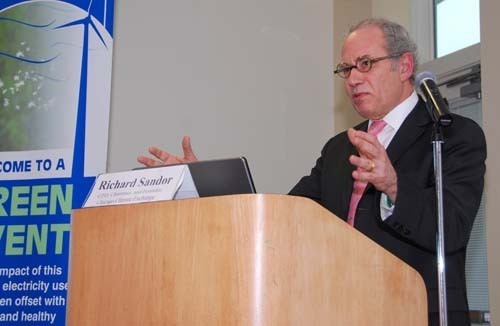
For the past decade business leaders have often argued that climate change is an issue for environmentalists to worry about, but that attitude is changing, says Mindy Lubber, president of Ceres, a coalition of investors and environmental leaders working to improve social, governmental and corporate practices.
“Anyone who thinks environmental issues are not economic issues certainly is not thinking about the representation of Rhode Island,” she said last week, at Rhode Island’s first Climate Exchange Summit. “Business leaders are standing up and saying we need to act and agree that there is a climate emergency.”
One message that rang clear during the March 31 event, held at Save The Bay’s Providence location, was the need to limit risks associated with climate change and to be sure investors, financial service firms and politicians are investing in companies developing and deploying clean technologies.
As part of Ceres’ Climate Risk Action Plan, analysts, ratings agencies and investment banks are encouraged to incorporate climate risks and opportunities as part of their investment-and- valuation analysis, including reporting on the impacts of long-term carbon costs (in the range of $20 to $40 per metric tone of CO2), especially on those carbon-intensive investments such as coal-fired power plants.
State Treasurer Frank Caprio last year joined the treasurers and comptrollers of 21 states, in signing a petition asking that the Securities and Exchange Commission require publicly traded companies to disclose the financial risks they face from global climate change. Caprio is also a part of Ceres’ Climate Change Action Plan which was supported by 50 institutional investments managing $1.75 trillion in assets.
“As a fiduciary of an $8 billion pension fund, I need to quantify risk assessment with investments we make or consider,” said Caprio, after the event, which was hosted by his office. “Climate is a real risk and Rhode Island as an institutional investor needs to make clear to potential companies that we see this area as a real threat to profitability.”
The global financial sector, with $6 trillion in market capitalization, is expected to play a role in supporting solutions to also decrease both U.S. and global greenhouse gas emissions, according to a Ceres report on Corporate Governance and Climate Change.
Bank of America is the only one of the 40 banks in the report to announce a specific initiative to decrease greenhouse gas emissions. The bank has announced a $20 billion, 10-year climate change policy for its utility corporate-finance portfolio, for which it is seeking a 7-percent reduction in the rate of emissions by 2009.
Another effort under way is that of the Chicago Climate Exchange, a voluntary greenhouse gas emission-reduction registry and trading system.
Already there are members of the Chicago exchange in Australia, India, Brazil, China, Columbia and Chile. And members, which include companies such as Abbott Laboratories, Dupont, and Bank of America, are required to cut emissions by 6 percent from 2000 to 2010 but have cut by 10 percent already.
Members of the exchange make a legally binding commitment to meet annual greenhouse reduction targets. Those who reduce below the target are allowed to sell or bank the surplus and those who emit above the targets must purchase a Carbon Financial Instrument Contract, which represents the equivalent of 100 metric tons of CO2.
The economic potential is vital, according to Richard Sandor the exchange’s chairman and chief executive. “We believe ultimately that emission trading will evolve like cotton trading did,” he said.
Caprio wants Rhode Island to not only be part of the change but ahead of the curve on the global shift toward a low-carbon future.
“This is our chance to be a leader in the new economy,” he said. •












